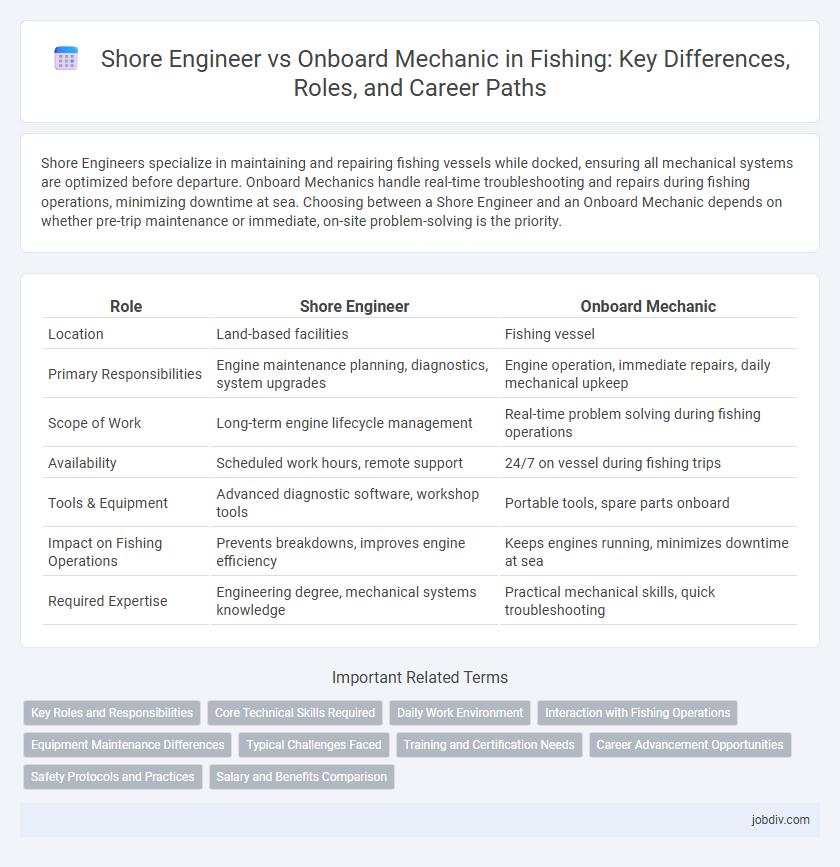Shore Engineers specialize in maintaining and repairing fishing vessels while docked, ensuring all mechanical systems are optimized before departure. Onboard Mechanics handle real-time troubleshooting and repairs during fishing operations, minimizing downtime at sea. Choosing between a Shore Engineer and an Onboard Mechanic depends on whether pre-trip maintenance or immediate, on-site problem-solving is the priority.
Table of Comparison
| Role | Shore Engineer | Onboard Mechanic |
|---|---|---|
| Location | Land-based facilities | Fishing vessel |
| Primary Responsibilities | Engine maintenance planning, diagnostics, system upgrades | Engine operation, immediate repairs, daily mechanical upkeep |
| Scope of Work | Long-term engine lifecycle management | Real-time problem solving during fishing operations |
| Availability | Scheduled work hours, remote support | 24/7 on vessel during fishing trips |
| Tools & Equipment | Advanced diagnostic software, workshop tools | Portable tools, spare parts onboard |
| Impact on Fishing Operations | Prevents breakdowns, improves engine efficiency | Keeps engines running, minimizes downtime at sea |
| Required Expertise | Engineering degree, mechanical systems knowledge | Practical mechanical skills, quick troubleshooting |
Key Roles and Responsibilities
Shore Engineers are responsible for the maintenance and repair of fishing vessel equipment at dockside, ensuring all machinery, including engines and navigation systems, are fully operational before departure. Onboard Mechanics handle real-time troubleshooting and repairs during fishing expeditions, managing engine performance, hydraulic systems, and electrical components to prevent downtime. Both roles are critical for vessel safety and efficiency, with Shore Engineers focusing on preparation and Onboard Mechanics ensuring continuous functionality at sea.
Core Technical Skills Required
Shore Engineers specialize in maintaining and repairing fishing vessel machinery and equipment from land-based facilities, requiring expertise in electrical systems, hydraulics, and welding for structural integrity. Onboard Mechanics demonstrate advanced skills in diagnosing and fixing mechanical issues under dynamic maritime conditions, with a strong focus on engine repair, refrigeration systems, and hydraulic winches essential for fishing operations. Both roles demand proficiency in preventive maintenance and troubleshooting to ensure vessel safety and optimal fishing performance.
Daily Work Environment
Shore engineers typically work in controlled workshop settings, maintaining and repairing fishing vessel equipment while having access to advanced diagnostic tools and spare parts. Onboard mechanics face challenging conditions at sea, performing immediate repairs on engines and mechanical systems amid constant motion, saltwater exposure, and limited resources. The daily environment significantly affects their troubleshooting approaches and the urgency of maintenance tasks.
Interaction with Fishing Operations
Shore engineers coordinate closely with fishing operations by managing equipment maintenance schedules and overseeing repairs to prevent downtime during critical fishing periods. Onboard mechanics interact directly with the crew, troubleshooting and fixing machinery in real-time to ensure continuous vessel operation while at sea. Both roles are essential for seamless fishing activities, with shore engineers providing remote support and onboard mechanics delivering immediate, hands-on technical assistance.
Equipment Maintenance Differences
Shore engineers primarily focus on the major repairs and preventive maintenance of fishing vessel equipment while docked, ensuring systems like engines, hydraulics, and winches are fully operational before departure. Onboard mechanics handle real-time troubleshooting and routine upkeep during fishing operations, addressing issues such as gear malfunctions and engine adjustments directly on the vessel. The shore engineer's role is more comprehensive in scope, involving extensive diagnostics and major part replacements, whereas the onboard mechanic ensures continuous equipment functionality in dynamic maritime conditions.
Typical Challenges Faced
Shore engineers often encounter challenges related to diagnosing equipment issues remotely and coordinating timely repairs without direct access to the vessel, leading to logistical delays. Onboard mechanics face typical problems such as maintaining complex machinery under constant exposure to harsh marine environments, limited spare parts, and performing urgent repairs during fishing operations. Both roles require precise technical skills and problem-solving under pressure to minimize downtime and ensure fishing vessel safety.
Training and Certification Needs
Shore engineers in the fishing industry require extensive training in marine electrical systems, hydraulic repairs, and regulatory compliance certifications such as STCW and marine engineering licenses. Onboard mechanics must complete specialized marine mechanical courses with certifications in engine maintenance, safety protocols, and emergency response, ensuring operational readiness during fishing expeditions. Both roles demand continuous professional development to keep pace with evolving maritime technology and industry safety standards.
Career Advancement Opportunities
Shore engineers in fishing enjoy diverse career advancement opportunities through roles in facility management, equipment design, and regulatory compliance, leveraging their deep understanding of shore-based operations. Onboard mechanics advance by gaining expertise in vessel maintenance, propulsion systems, and emergency repairs, often progressing to chief engineer or technical supervisor roles at sea. Both careers offer pathways to specialized certifications and leadership positions, enhancing long-term professional growth in the fishing industry.
Safety Protocols and Practices
Shore engineers ensure safety protocols by conducting pre-departure inspections and maintaining shore-based equipment to prevent mechanical failures during fishing operations. Onboard mechanics are responsible for real-time monitoring and immediate repair of engine and machinery issues, adhering to safety procedures to protect crew members from accidents. Both roles implement rigorous safety practices, including risk assessments and emergency response drills, to minimize hazards in the fishing environment.
Salary and Benefits Comparison
Shore engineers typically earn a salary range between $70,000 and $100,000 annually, with benefits including health insurance, retirement plans, and regular working hours, reflecting their land-based roles supporting fishing fleet operations. Onboard mechanics, earning approximately $60,000 to $90,000 per year, receive hazard pay, overtime compensation, and comprehensive maritime insurance due to the demanding and risky environment at sea. Salary differences stem from the contrasting work settings and responsibilities, with shore engineers benefiting from stability and onboard mechanics gaining higher risk-related pay and unique seafaring advantages.
Shore Engineer vs Onboard Mechanic Infographic

 jobdiv.com
jobdiv.com